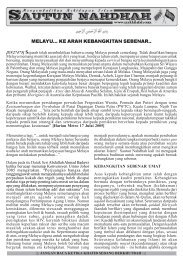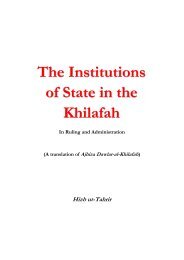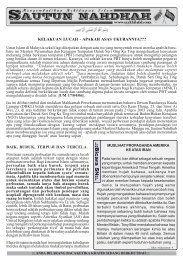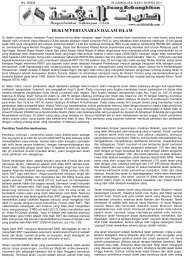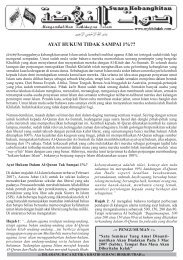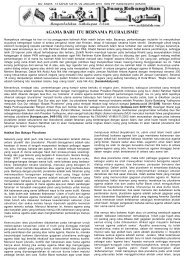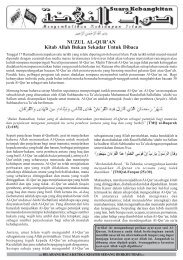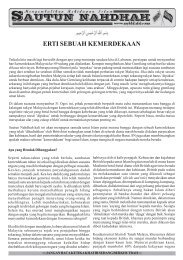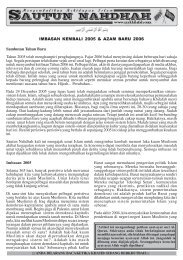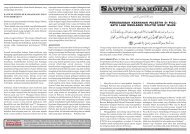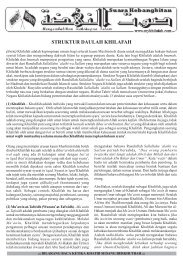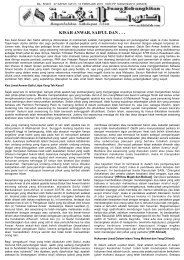A Warm Call from Hizb ut-Tahrir to the Muslims - MyKhilafah.com
A Warm Call from Hizb ut-Tahrir to the Muslims - MyKhilafah.com
A Warm Call from Hizb ut-Tahrir to the Muslims - MyKhilafah.com
You also want an ePaper? Increase the reach of your titles
YUMPU automatically turns print PDFs into web optimized ePapers that Google loves.
26 u A <strong>Warm</strong> <strong>Call</strong> <strong>from</strong> <strong>Hizb</strong> <strong>ut</strong>-<strong>Tahrir</strong> <strong>to</strong> <strong>the</strong> <strong>Muslims</strong><br />
with which <strong>the</strong> credi<strong>to</strong>r ' indicates that this <strong>the</strong>ory should be considered<br />
as an agreement based on contract. This definition excludes those<br />
transactions that exclude any form of agreement like <strong>the</strong> award of a<br />
grant for example, although this would be covered by <strong>the</strong> right in<br />
personam. Also excluded <strong>from</strong> this definition are those transactions that<br />
originate <strong>from</strong> one individual and do not involve anyone else, such as <strong>the</strong><br />
transactions <strong>the</strong>y call <strong>the</strong> 'individualistic will', for example, formation of<br />
share <strong>com</strong>panies and cooperatives, bequests and reward or prize<br />
incentives. In spite of this, <strong>the</strong> Capitalists classified all <strong>the</strong>se under <strong>the</strong><br />
Theory of Liability. Fur<strong>the</strong>rmore, <strong>the</strong>re are many o<strong>the</strong>r transactions that<br />
occur between different individuals b<strong>ut</strong> are not covered by this<br />
definition, such as charitable endowments, <strong>the</strong> giving of Zakah and<br />
charity and so on, a matter which indicates <strong>the</strong> invalidity of <strong>the</strong><br />
definition. Since <strong>the</strong> definition of something is always based upon a<br />
depiction of <strong>the</strong> reality, <strong>the</strong>n ei<strong>the</strong>r <strong>the</strong> definition or <strong>the</strong> reality itself is<br />
false. It is <strong>the</strong>refore necessary <strong>to</strong> examine <strong>the</strong> reality carefully and<br />
accurately <strong>to</strong> redefine it correctly. The alternative definition of <strong>the</strong><br />
Theory of Liability as 'a legal condition according <strong>to</strong> which…' means<br />
that liability must be considered as a legal issue, although in tr<strong>ut</strong>h it is a<br />
relationship that has been agreed by civil law and not just a legal issue.<br />
For example, a <strong>com</strong>mand issued by <strong>the</strong> State <strong>to</strong> its citizens not <strong>to</strong> c<strong>ut</strong><br />
down certain forests or just forests in general, is a legal issue in which an<br />
individual or group of individuals are obliged <strong>to</strong> abstain <strong>from</strong><br />
performing a particular action. According <strong>to</strong> <strong>the</strong> Capitalist viewpoint,<br />
this issue is considered <strong>from</strong> <strong>the</strong> civic law, although it is not. In o<strong>the</strong>r<br />
words such a <strong>com</strong>mand would be considered <strong>from</strong> <strong>the</strong> liability angle<br />
even though it clearly has no connection with liability. This example<br />
highlights <strong>the</strong> invalidity of this definition.<br />
The view that liability is based on a legal bond between <strong>the</strong> credi<strong>to</strong>r<br />
and <strong>the</strong> deb<strong>to</strong>r is also wrong, whe<strong>the</strong>r it is described as a personal or a<br />
financial bond. This is because it is not a bond b<strong>ut</strong> a human relationship<br />
that emerged due <strong>to</strong> <strong>the</strong> human being's endeavour <strong>to</strong> satisfy his organic<br />
needs and instincts. Therefore, this could be a relationship between two<br />
individuals over an interest (maslahah), or a relationship <strong>from</strong> one<br />
individual, such as originating divorce, issuing a will and charitable<br />
endowment. The issue at hand is not <strong>the</strong> existence of two individuals or<br />
<strong>the</strong> existence of an individual <strong>to</strong>ge<strong>the</strong>r with a material item. Ra<strong>the</strong>r what<br />
should be looked at is treating and solving <strong>the</strong> individual's problem in a<br />
A <strong>Warm</strong> <strong>Call</strong> <strong>from</strong> <strong>Hizb</strong> <strong>ut</strong>-<strong>Tahrir</strong> <strong>to</strong> <strong>the</strong> <strong>Muslims</strong> u 27<br />
manner that organises his instincts and organic needs and regulates his<br />
relationships. The tr<strong>ut</strong>h as indicated by <strong>the</strong> reality of <strong>the</strong> human being's<br />
existence, is that liability in its own right does not exist. The correct<br />
issue is <strong>the</strong> relationship between two individuals over an interest that<br />
must be resolved and organised by <strong>the</strong> law. Events, questions, issues and<br />
problems involving an individual or individuals are what create<br />
relationships and no o<strong>the</strong>r fac<strong>to</strong>rs are involved. It is <strong>the</strong> law that decides<br />
<strong>to</strong> consider such a relationship or not, and nothing else. There is no<br />
liability in this matter ei<strong>the</strong>r in <strong>the</strong> financial or in <strong>the</strong> personal sense.<br />
This is because <strong>the</strong> issue does not relate <strong>to</strong> a relationship between a<br />
credi<strong>to</strong>r and a deb<strong>to</strong>r, nor does it relate <strong>to</strong> a bond between an individual<br />
and a material item. Ra<strong>the</strong>r <strong>the</strong> subject matter is summed up in a<br />
relationship that exists between two individuals over a specific interest.<br />
This interest could relate <strong>to</strong> property or possession, or could exist at<br />
<strong>the</strong> point of generation or at <strong>the</strong> point of exec<strong>ut</strong>ion. The relationship is<br />
generated by <strong>the</strong> interest, i.e. procuring a benefit or removing harm, and<br />
it is organised by <strong>the</strong> law. So <strong>the</strong> issue of selling or trading is a<br />
relationship between two people at <strong>the</strong> point of generation and <strong>the</strong><br />
subject matter is property or possession. The incentive of reward for <strong>the</strong><br />
individual who finds lost property is a relationship between two people<br />
at <strong>the</strong> point of exec<strong>ut</strong>ion and it concerns <strong>the</strong> subject of property.<br />
Marriage is a relationship between two individuals, b<strong>ut</strong> <strong>the</strong> subject at<br />
hand is an interest that is not material. Beside <strong>the</strong> relationship between<br />
two individuals, <strong>the</strong>re also exist relationships based on <strong>the</strong> issue of<br />
property or material items such as charitable endowments, <strong>the</strong> giving of<br />
Zakah and charity, establishing places of worship and setting up public<br />
services like <strong>the</strong> provision of pastures and drinking water. All this leads<br />
<strong>to</strong> <strong>the</strong> conclusion that liability, according <strong>to</strong> <strong>the</strong> understanding based<br />
upon Western legislation and <strong>from</strong> which sprang Western canons and<br />
laws, does not exist ei<strong>the</strong>r in <strong>the</strong> personal or financial aspect.<br />
Consequently, liability in <strong>the</strong> meaning <strong>the</strong>y wanted, which are <strong>the</strong><br />
personal rights, does not also exist. Therefore, transactions are not an<br />
a<strong>ut</strong>hority that a particular individual holds over some material item, nor<br />
it is a bond between two individuals. Ra<strong>the</strong>r, it is a relationship between<br />
two people over an interest accepted by <strong>the</strong> law. This applies <strong>to</strong><br />
transactions that happen between two individuals at <strong>the</strong> point of<br />
generation i.e. a lease or tenancy agreement, or at <strong>the</strong> point of exec<strong>ut</strong>ion<br />
i.e. reward given <strong>to</strong> <strong>the</strong> individual who performs a certain action. It also<br />
applies <strong>to</strong> transactions that originate <strong>from</strong> <strong>the</strong> actions of one individual,<br />
1<br />
2<br />
3<br />
4<br />
5<br />
6<br />
7<br />
8<br />
9<br />
10<br />
11<br />
12<br />
13<br />
14<br />
15<br />
16<br />
17<br />
18<br />
19<br />
20<br />
21<br />
22<br />
23<br />
24<br />
25<br />
26<br />
27<br />
28<br />
29<br />
30<br />
31<br />
32<br />
33<br />
34<br />
35<br />
36<br />
37<br />
38<br />
39



